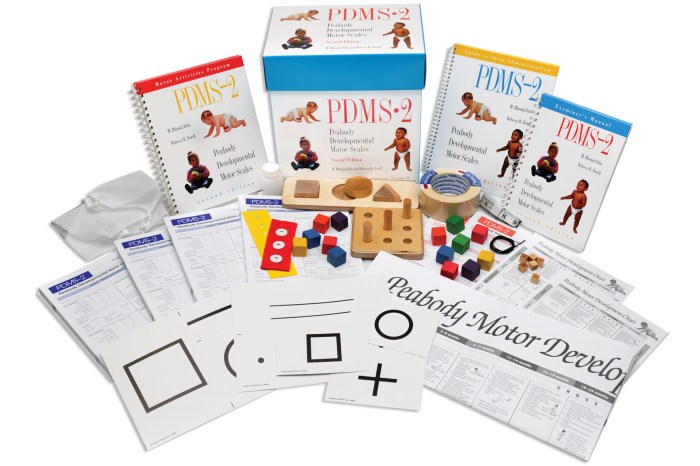Peabody developmental motor scales 3rd edition – The Peabody Developmental Motor Scales – 3rd Edition (PDMS-3) stands as a comprehensive assessment tool designed to evaluate motor development in children. This widely recognized assessment offers a structured and standardized approach to identifying strengths and weaknesses in various motor domains, providing valuable insights for intervention and progress monitoring.
The PDMS-3 is meticulously crafted to assess gross motor skills, fine motor skills, and visual-motor integration, encompassing a broad range of developmental milestones. Its comprehensive subtests target specific areas of motor function, ensuring a thorough evaluation of a child’s motor abilities.
Overview of the Peabody Developmental Motor Scales
3rd Edition (PDMS-3)
3rd Edition (PDMS-3)

The PDMS-3 is a comprehensive developmental assessment tool designed to evaluate motor skills in children from birth to 5 years of age. It provides a detailed assessment of gross motor, fine motor, and visual-motor skills, making it valuable for identifying developmental delays, monitoring progress, and guiding intervention planning.
The PDMS-3 consists of 18 subtests organized into three domains: Gross Motor (6 subtests), Fine Motor (8 subtests), and Visual-Motor (4 subtests). Each subtest assesses a specific motor skill, such as balance, coordination, dexterity, and visual-motor integration.
Administration and Scoring of the PDMS-3
The PDMS-3 is administered by a qualified examiner who has received training and certification in the assessment. The examiner observes the child performing various motor tasks and records their performance using a standardized scoring system.
The scoring system is based on a 0-3 scale, with 0 indicating no observable response and 3 indicating full performance of the task. The examiner calculates a raw score for each subtest and converts it to a standardized score, which is then used to generate a developmental profile.
Developmental Domains Assessed by the PDMS-3, Peabody developmental motor scales 3rd edition
Gross Motor
The Gross Motor domain assesses skills such as balance, coordination, and locomotion. Subtests include: Walking, Running, Jumping, Hopping, Catching, and Throwing.
Fine Motor
The Fine Motor domain assesses skills such as dexterity, manipulation, and precision. Subtests include: Finger Dexterity, Bilateral Coordination, Manual Dexterity, Tool Use, Drawing, Cutting, Copying, and Writing.
Visual-Motor
The Visual-Motor domain assesses skills such as visual-motor integration, eye-hand coordination, and spatial awareness. Subtests include: Eye-Hand Coordination, Visual Tracking, Form Perception, and Spatial Relations.
Psychometric Properties of the PDMS-3
The PDMS-3 has demonstrated strong psychometric properties. It has high reliability, with inter-rater reliability coefficients ranging from .80 to .99. The test-retest reliability coefficients range from .75 to .90, indicating that the assessment is stable over time.
The PDMS-3 also has good validity. Studies have shown that it correlates well with other measures of motor development, such as the Bruininks-Oseretsky Test of Motor Proficiency (BOT-2) and the Movement Assessment Battery for Children (MABC).
Essential Questionnaire: Peabody Developmental Motor Scales 3rd Edition
What is the purpose of the PDMS-3?
The PDMS-3 is designed to assess motor development in children, providing a comprehensive evaluation of gross motor skills, fine motor skills, and visual-motor integration.
Who is the target population for the PDMS-3?
The PDMS-3 is appropriate for children between the ages of 0 and 8 years, covering a wide range of developmental milestones.
How is the PDMS-3 administered and scored?
The PDMS-3 is administered by a trained examiner who follows standardized procedures. Scoring is based on the child’s performance on each subtest, with raw scores converted to age-normed standard scores.
What are the strengths of the PDMS-3?
The PDMS-3 is a reliable and valid assessment tool, with strong psychometric properties. It provides a comprehensive evaluation of motor development, covering a wide range of skills.
What are the limitations of the PDMS-3?
The PDMS-3 may not be appropriate for children with severe motor impairments or cognitive delays. It also requires a trained examiner to administer and score.


